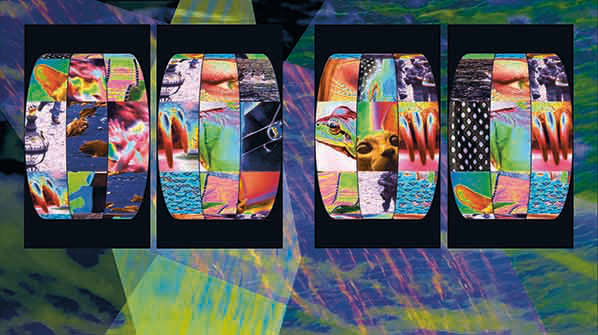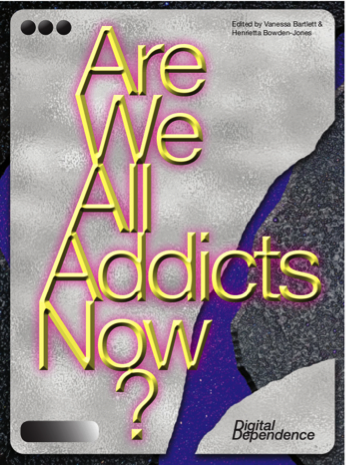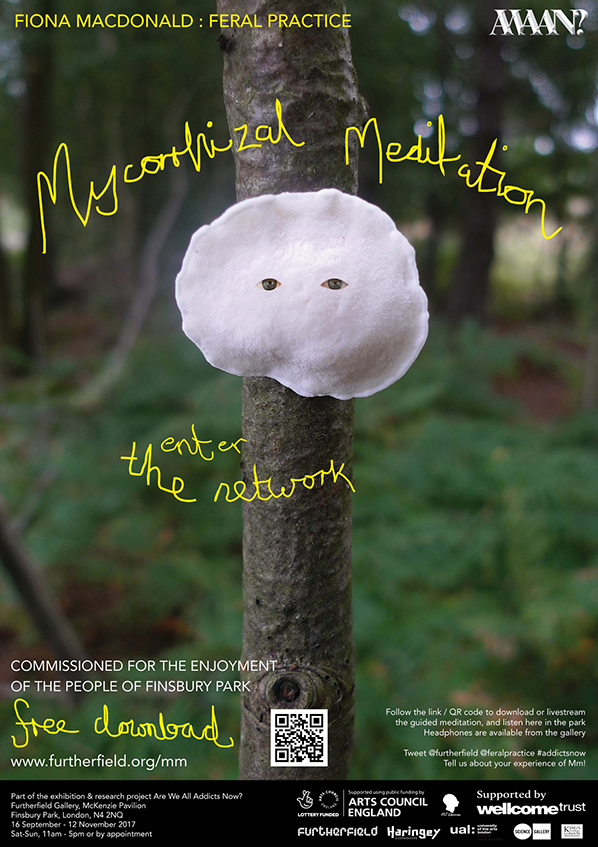



DOWNLOAD PRESS RELEASE
FREE DOWNLOAD OF EXHIBITION DOCUMENTATION
SEE IMAGES FROM THE PRIVATE VIEW
Featuring Katriona Beales and Fiona MacDonald.
The exhibition and research project Are We All Addicts Now? explores the seductive and addictive qualities of the digital.
Artist Katriona Beales’ work addresses the sensual and tactile conditions of her life lived online: the saturated colour and meditative allure of glowing screens, the addictive potential of infinite scroll and notification streams. Her new body of work for AWAAN re-imagines the private spaces in which we play out our digital existence. The exhibition includes glass sculptures containing embedded screens, moving image works and digitally printed textiles. Beales’ work is complemented by a new sound-art work by artist and curator Fiona MacDonald : Feral Practice.
Beales celebrates the sensuality and appeal of online spaces, but criticises how our interactions get channeled through platforms designed to be addictive – how corporations use various ‘gamification’ and ‘neuro-marketing’ techniques to keep the ‘user’ on-device, to drive endless circulation, and monetise our every click. She suggests that in succumbing to online behavioural norms we emerge as ‘perfect capitalist subjects’.
For Furtherfield, Beales has constructed a sunken ‘bed’ into which visitors are invited to climb, where a glowing glass orb flutters with virtual moths repeatedly bashing the edges of an embedded screen. A video installation, reminiscent of a fruit machine, displays a drum of hypnotically spinning images whose rotation is triggered by the movement of gallery visitors. Beales recreates the peculiar, sometimes disquieting, image clashes experienced during her insomniac journeys through endless online picture streams – beauty products lining up with death; naked cats with armed police.

Glass-topped tables support the amorphous curves of heavy glass sculptures, which refract the multi-coloured light of tiny screens hidden inside. Visualisations of eye-tracking data (harvested live from gallery visitors) scatter across the ceiling. On the exterior wall of the gallery, an LED scrolling sign displays text Beales’ has compiled, based on comments from online forums about internet addiction.
Where Beales addresses the near-inescapability of machine-driven connection, Feral Practice draws us into the networks in nature. Mycorrhizal Meditation is a sound-art work for free download, accessed via posters in Furtherfield Gallery and across Finsbury Park. MM takes the form of a guided meditation, journeying through the human body and down into the ‘underworld’ of living soil, with its mycorrhizal network formed of plant roots and fungal threads. It combines spoken word and sound recordings of movement and rhythm made in wooded places. Feral Practice complicates the idea of nature as ‘ultimate digital detox’, and alerts us to the startling interconnectivity of beyond-human nature, the ‘wood-wide-web’ that pre-dates our digital connectivity by millennia. (Download Mycorrhizal Mediation here)
Are We All Addicts Now? has been developed in collaboration with artist-curator Fiona MacDonald : Feral Practice, clinical psychiatrist Dr Henrietta Bowden-Jones, and curator Vanessa Bartlett.
Glowing light of screens makes us #addictsnow – they are the mini-suns we bask in to keep away the dark https://t.co/jedrDUE2ZWpic.twitter.com/BmTTbFckFp
— furtherfield (@furtherfield) July 27, 2017
View more of the comissioned gifs and tweets here
In the run up to the exhibition, artists Charlotte Webb and Connor Rigby have been commissioned to produce a series of gifs and tweets to stimulate debate around the designed-for-addiction nature of digital devices, and the ethics and politics that surround this. Join the conversation @furtherfield on Twitter and Instagram using the hashtag #addictsnow
Accompanying the exhibition, a book designed by Stefan Schafer and edited by Vanessa Bartlett and Henrietta Bowden-Jones, brings together Beales’ and MacDonald’s artwork and writing with essays from contributors in the fields of anthropology, digital culture, psychology and philosophy. This book is the first interdisciplinary study of the emerging field of internet addiction. Contributors will discuss their essays at a symposium convened by Vanessa Bartlett at Central Saint Martins in November 2017. Advanced copies of the book are on sale at the Liverpool University Press website https://liverpooluniversitypress.co.uk/products/100809

Beales’ work ‘Entering the Machine Zone’ has been co-commissioned with Science Gallery London. An iteration of the work will be presented as part of HOOKED, the opening season of the new Science Gallery London, curated by Hannah Redler.
Exhibition Tour of Are We All Addicts Now? with Ruth Catlow and Katriona Beales
Saturday 16th September 2017, 2-4 pm
Furtherfield Gallery
Join Furtherfield co-director Ruth Catlow and artist Katriona Beales to find out more about the works featured in the exhibition Are We All Addicts Now? and to discuss the issues that it raises around digital addiction and online behaviour.FREE | booking essential
Late Night Opening & Film Screening
Friday 29th September 2017, 5 – 8.30pm
Furtherfield Gallery & Commons
A late night opening of the Are We All Addicts Now? exhibition, followed by a screening of artists’ moving image work that has informed the development of the exhibition.
Gallery Open: 5 – 7pm
Screening: 7 – 8.30pm
FREE | booking essential
Mycorrhizal Event with Fiona MacDonald : Feral Practice
Saturday 21st October 2017, 2 – 4pm
Furtherfield Commons
Fiona MacDonald: Feral Practice presents a lecture, a performance, and a fungi walk. Informed by the history, art and science of human-fungal relations, these experiences explore themes of reciprocity, intuitive and nonverbal interconnection between people, psychedelic consciousness, fungal songs, shamanic journeying, and plant communication.
FREE | booking essential
Visual Matrix Workshop with Vanessa Bartlett
Thursday 2nd November, 4 – 6.30pm
Furtherfield Commons
Join curator Vanessa Bartlett for a research workshop responding to works in the Are We All Addicts Now? exhibition. The visual matrix is a new psychosocial research technique that we are using to generate audience response to this project. Content generated during this session will inform our evaluation of the exhibition.
For more information and to book your place contact info [at] vanessabartlett.com
FREE | email v.bartlett [at] unsw.edu.au to book your place.
Are We All Addicts Now? Symposium and Book Launch at CSM
Tuesday 7th November, 6.30-9pm
Central Saint Martins, University of the Arts London, 1 Granary Square, London, N1C 4AA
This event celebrates the publication of Are We All Addicts Now? Digital Dependence edited by Vanessa Bartlett and Henrietta Bowden-Jones and will feature presentations from many of the book’s key contributors who include:
During the symposium, psychologists, philosophers and artists come together to discuss the emerging diagnosis of internet addiction. Taking into account our precarious economic and political climate, they will ask whether internet addiction should be understood as a form of illness, or simply a sensible adaptation to our current environment? As increasing numbers of people struggle to moderate their online behaviours, this event will also explore artists’ strategies for counteracting the seductive, addiction-making qualities of digital space.
Convened by curator Vanessa Bartlett
Presented in partnership with Central Saint Martins Art/Design and Science Research Group
The book, ‘Are We All Addicts Now?’ is available from Liverpool University Press: liverpooluniversitypress.co.uk/products/100809
See photos from the Symposium and Book Launch
See a recording of the Symposium and Book Launch – Part 1 | Part 2
£4 – £7 | booking essential
Katriona Beales is an artist who makes digital artefacts, moving image and installation, stressing the physicality of digital life. Are We All Addicts Now? develops Beales’ 2015 work ‘White Matter’ (a FACT commission for ‘Group Therapy: Mental Distress in a Digital Age’) which is showing at the University of New South Wales, Sydney as part of Anxiety Festival (Sept 2017). Beales’ received an MA from Chelsea College of Arts and has an artist profile on Rhizome.org
www.katrionabeales.com
Fiona MacDonald is an artist, curator and writer specializing in human-nonhuman relationship. As Feral Practice, she works in co-production with a collective of human and nonhuman persons. Current projects include Foxing, (see PEER London, 2017) Ant-ic Actions (see Ethical Entanglements, Bloomsbury Press, forthcoming) Homo Mycelium, and Wood to World (London, Kent, Aberdeen 2015-17).
www.feralpractice.com
Vanessa Bartlett is a researcher and curator based between Australia and the UK. She studies and teaches at UNSW Art & Design, Sydney where her research investigates connections between digital technologies and mental health through reflective curatorial practice. Her recent exhibition Group Therapy: Mental Distress in a Digital Age showed at FACT (Foundation for Art and Creative Technology), UK in 2015 and opens at UNSW Galleries Sydney in September 2017.
www.vanessabartlett.com
Dr. Charlotte Webb is an artist and deviant academic. She speaks and exhibits internationally, focusing on the web as a medium for creative practice, critical thinking and collective action.
Furtherfield is an internationally renowned arts organisation specialising in labs, exhibitions and debate for increased, diverse participation with emerging technologies. At Furtherfield Gallery and Furtherfield Lab in London’s Finsbury Park, we engage more people with digital creativity, reaching across barriers through unique collaborations with international networks of artists, researchers and partners. Through art Furtherfield seeks new imaginative responses as digital culture changes the world and the way we live.
“There is no other gallery like Furtherfield. Situated in the middle of Finsbury Park they attract people from all walks of life and focus on contemporary technology and how it affects the lives of people and the world we live in.” (Liliane Lijn, artist)
Furtherfield Gallery
McKenzie Pavilion
Finsbury Park, London, N4 2NQ
Visiting Information
Thanks to:
The Wellcome Trust
Arts Council England
Science Gallery London
Central Saint Martins
BF Skinner Foundation
Haringey Council
Bruce Marks (glass artist)
Rob Prouse (raspberry Pi and AV technician)
Part of the Are We All Addicts Now? exhibition at Furtherfield Gallery.
DOWNLOAD PRESS RELEASE
SEE IMAGES FROM THE SYMPOSIUM AND BOOK LAUNCH
SEE A RECORDING OF THE SYMPOSIUM AND BOOK LAUNCH – PART 1 | PART 2
This event celebrates the publication of Are We All Addicts Now? Digital Dependence edited by Vanessa Bartlett and Henrietta Bowden-Jones and will feature presentations from many of the book’s key contributors who include:
During the symposium, psychologists, philosophers and artists come together to discuss the emerging diagnosis of internet addiction. Taking into account our precarious economic and political climate, they will ask whether internet addiction should be understood as a form of illness, or simply a sensible adaptation to our current environment? As increasing numbers of people struggle to moderate their online behaviours, this event will also explore artists’ strategies for counteracting the seductive, addiction-making qualities of digital space.
Ticket price includes a drink *:
£7 full price | £4 concessions (UAL staff/student, external student unemployed, senior)
*ticket price covers a token for 1 alcoholic drink or 2 soft drinks, with a pay bar available for additional purchases.
BOOKING ESSENTIAL
The publication will be available to purchase on the night at the discounted price of £10 (cash only, RRP £14.95). The book, ‘Are We All Addicts Now?’ is also available from Liverpool University Press: liverpooluniversitypress.co.uk/products/100809
Convened by curator Vanessa Bartlett
Presented in partnership with Central Saint Martins Art/Design and Science Research Group
You are invited to join us for a research workshop responding to the Are We All Addicts Now? exhibition at Furtherfield Gallery.
The visual matrix is a new psychosocial research technique that we are using to generate audience response to the project. Vanessa Bartlett has written a blog about this fascinating curatorial research process which is designed to test how a broad range of arts, science and technology audiences respond to interdisciplinary arts projects. Content generated during this session will inform our evaluation of Are We All Addicts Now?
Participants will be invited to view the exhibition at Furtherfield Gallery. Then, over the course of 45 minutes, participants will engage in a process of generating images and associations related to their experience of the work that they have seen. You will be seated throughout, engage with other participants and be encouraged to provide verbal associations if and when you are comfortable speaking. The visual matrix will be audio recorded. Following this there will be a short break and a second session lasting 45 minutes where participants will be asked to consider the images and associations generated by the group in a discussion. Optional five-minute ‘exit interviews’ with individual participants will take place at the end of the process.
Our research team will study the material that we have recorded. Anonymised excerpts will be used for further research and publication including conference and journal articles.
If you are interested in participating please contact v.bartlett [at] unsw.edu.au for more information.
The visual matrix method was created and developed by Lynn Froggett and her team at the Psychosocial Research Unit at University of Central Lancashire.
Research Team: Dr Elizabeth Muller and Miss Vanessa Bartlett, UNSW Australia. Ethics Approval No: HC16612
Email v.bartlett [at] unsw.edu.au to book your place.
Furtherfield Gallery
McKenzie Pavilion
Finsbury Park, London, N4 2NQ
Visiting Information
A late night opening of the Are We All Addicts Now? exhibition, followed by a screening of artists’ moving image work that has informed the development of the exhibition.
The exhibition and research project Are We All Addicts Now? explores the seductive and addictive qualities of the digital.
Artist Katriona Beales’ work addresses the sensual and tactile conditions of her life lived online: the saturated colour and meditative allure of glowing screens, the addictive potential of infinite scroll and notification streams. Her new body of work for Are We All Addicts Now? re-imagines the private spaces in which we play out our digital existence. The exhibition includes glass sculptures containing embedded screens, moving image works and digitally printed textiles. Beales’ work is complemented by a new sound-art work by artist and curator Fiona MacDonald : Feral Practice.
Beales celebrates the sensuality and appeal of online spaces, but criticises how our interactions get channeled through platforms designed to be addictive – how corporations use various ‘gamification’ and ‘neuro-marketing’ techniques to keep the ‘user’ on-device, to drive endless circulation, and monetise our every click. She suggests that in succumbing to online behavioural norms we emerge as ‘perfect capitalist subjects’.
Part of the Are We All Addicts Now? exhibition at Furtherfield Gallery
Furtherfield co-director Ruth Catlow and artist Katriona Beales will be talking about the artwork featured in the exhibition at Furtherfield Gallery, Are We All Addicts Now?, followed by a group discussion.
In the exhibition, Katriona Beales addresses the sensual and tactile conditions of her life lived online: the saturated colour and meditative allure of glowing screens, the addictive potential of infinite scroll and notification streams. Her new body of work for Are We All Addicts Now? re-imagines the private spaces in which we play out our digital existence. Beales celebrates the sensuality and appeal of online spaces, but criticises how our interactions get channeled through platforms designed to be addictive – how corporations use various ‘gamification’ and ‘neuro-marketing’ techniques to keep the ‘user’ on-device, to drive endless circulation, and monetise our every click. She suggests that in succumbing to online behavioural norms we emerge as ‘perfect capitalist subjects’.
Join Ruth and Katriona to find out more about the works featured in the exhibition and to discuss the issues that it raises around digital addiction and online behaviour.
Katriona Beales is an artist who makes digital artefacts, moving image and installation, stressing the physicality of digital life. Are We All Addicts Now? develops Beales’ 2015 work ‘White Matter’ (a FACT commission for ‘Group Therapy: Mental Distress in a Digital Age’) which is showing at the University of New South Wales, Sydney as part of Anxiety Festival (Sept 2017). Beales’ received an MA from Chelsea College of Arts and has an artist profile on Rhizome.org
www.katrionabeales.com
Ruth Catlow is an artist and curator working with emancipatory network cultures, practices and poetics. She is co-founding director, with Marc Garrett, of Furtherfield. As new digital processes change the way we live, Furtherfield champions the need for society and culture to evolve critical, aesthetic and ethical responses in parallel, bringing together cultural and technological innovation. Recent commissions include Time Is Speeding Up (20-21 Visual Arts Centre); Sociality-machine (Tate); and Play the Web We Want (Southbank Centre). Catlow is named by the Foundation for P2P alternatives in their list of 100 women Co-creating the P2P society.
ruthcatlow.net
furtherfield.org
Furtherfield Gallery
McKenzie Pavilion
Finsbury Park, London, N4 2NQ
Visiting Information
Mycorrhizal Meditation is a sound-art work by Fiona MacDonald : Feral Practice, commissioned for the enjoyment of the people of Finsbury Park, as part of the exhibition Are We All Addicts Now?
It is designed to be listened to in the park, but can be listened to anywhere.
Mm is a guided meditation (approx. 15 mins) that choreographs a connective journey through the human body and down into a dynamic under-soil world. The voice of the artist entwines with sound recordings made in wooded places, using ambient and contact microphones, and techniques that convert electrical signals in plants and fungi into sound.
Feral Practice complicates a notion of nature as ‘ultimate digital detox’, and guides the user towards the startling interconnectivity of beyond-human nature, the ‘wood-wide-web’ that predates our digital connectivity by millennia. The mycorrhizal network is made up of fungi and plant tissue, and acts both as a woodland’s food store and communication centre.
Mm is suitable for ages 8 years and above.
It can be listened to alone or in a group.
Please tweet @feralpractice @furtherfield #addictsnow to share your experience of the meditation.
